Call To Delay UN Climate Summit
Air Date: Week of September 17, 2021
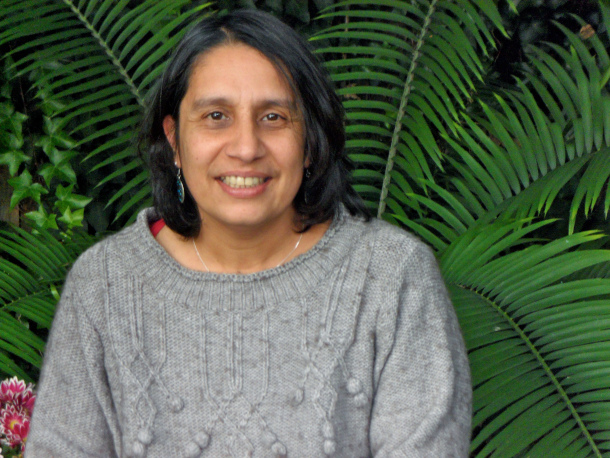
Tasneem Essop is the Executive Director of Climate Action Network International. (Photo: Courtesy of CAN International)
As COVID-19 spread continues and vaccine access remains limited in some of the countries most vulnerable to climate impacts, civil society is calling for a delay of the much-anticipated COP26 climate summit planned for Glasgow, Scotland this November. Host Steve Curwood talks to the Executive Director of Climate Action Network (CAN) International, Tasneem Essop, to understand why her coalition , which has official observer status at the UN Climate negotiations, is calling for the postponement, the injustices of institutional racism, and what can be seen as a vaccine apartheid.
Transcript
CURWOOD: From PRX and the Jennifer and Ted Stanley Studios at the University of Massachusetts Boston, this is Living on Earth. I’m Steve Curwood.
With the pandemic still raging, many observer parties at the United Nations climate negotiations are calling for a postponement of the COP26 summit, when countries are expected make further commitments under the Paris agreement and adopt certain rules. As many as 25,000 people are slated to attend the gathering in Glasgow, Scotland in November but such a large gathering poses serious health risks, especially for the unvaccinated. Many of the poor countries with the least access to vaccines are the same countries most at risk to devastating climate disruption. And while US climate envoy John Kerry and COP26 host Boris Johnson say it must go on as scheduled, given the pandemic has already delayed it a year, others say that view is insensitive to the economic and social divides between the Global North and Global South. Tasneem Essop is the Executive Director of the Climate Action Network, one of the official UN observers that is calling for postponement of COP 26 until all participants including civil society can access the vaccine. She joins us now from near Capetown South Africa. Tasneem, welcome to Living on Earth.
ESSOP: Thank you very much, nice to be here.
CURWOOD: So, as we're talking and recording this conversation, there's some 60 countries and territories on the UK's, so called red list. That is, travelers from those countries would have to undergo strict testing and quarantine rules in order to even enter the UK. What would that mean for the climate talks to miss out on representatives from those countries? Or those that go through the quarantine, I gather, that's rather expensive, isn't it?
ESSOP: Yeah. Well, let me just say that after our call for postponement, the UK Government conceded and said that they would pay for quarantine of delegates who have badges. Right, so not for everybody. There's a whole other set of issues related to quarantines. You know, because there are expectations, maybe in other countries, that you need to quarantine before you head off, as you would know, from one hub to the other there's different rules. But be that as it may, they conceded on that one. But if we look at the red listed countries, as you said there's 60, and you saw who they were, you would also immediately recognize that these are the poorest and most vulnerable countries in the world. Being a red listed country, and at the same time, being vulnerable to the climate crisis, these two coincide. That is absolutely unacceptable in this day and age, that we would sit with this kind of vaccine apartheid. And if you're not at the decision-making tables in a proper, inclusive, equitable way, then we are sitting with a problem.
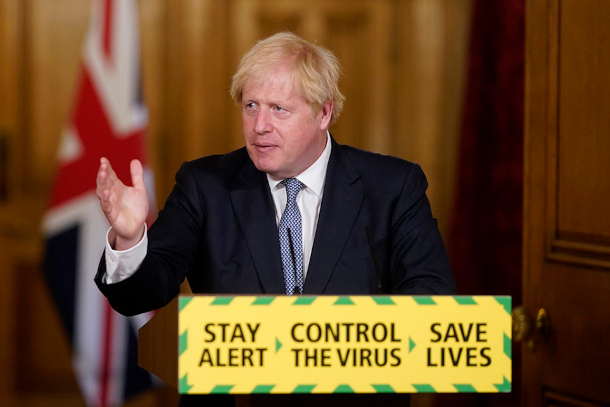
Prime Minister Boris Johnson giving a statement on the coronavirus pandemic in July 2020. (Photo: UK Government, Wikimedia Commons, OGL v.3)
CURWOOD: You mentioned vaccine apartheid, you're speaking to us from South Africa, which had a tragic history of apartheid. To what extent do you think that vaccine apartheid is connected to how we are handling internationally the climate crisis? What could be the price of that?
ESSOP: When we talk about the history of our world, and how it is that in this world that we live in right now, you still have this massive inequality, and that the fault lines of those massive inequalities remain the same. You in the U.S., for example, you would know that during the pandemic, what were the fault lines? That in the U.S., it was mainly those communities, black, people of color, indigenous, etcetera, that suffered the impact of the pandemic the worse. Now, with the climate crisis, those fault lines are exactly the same. The issue will be that those in the north who are well resourced will have the means and the abilities and the technologies to be able to deal with the crisis far better than those who are living in the vulnerable south. Far better. The impacts will be global. The reality is, that is a form of apartheid. The haves, and the have nots. It generally is the have nots are going to be those who are people of color, indigenous from the global south, people of color in the global north, black people, etcetera, etcetera. That is the story of the world.
CURWOOD: Tasneem, for years, the UN Framework Convention on Climate Change, the body that holds these conferences of the parties to negotiate climate, have had a basis in institutional racism, some would say. For example, the original Kyoto plan talked about Annex 1 countries that were pretty much all white, and Non-Annex, or then later called Annex B countries, that were all pretty much the countries of color. The explanation was that the Annex 1 countries were industrial and that the others were developing. Yet, you know, Brazil makes airplanes, and I don't think Bulgaria does. So, to what extent is this call to continue with the Conference of the Parties part of a system of institutional racism?
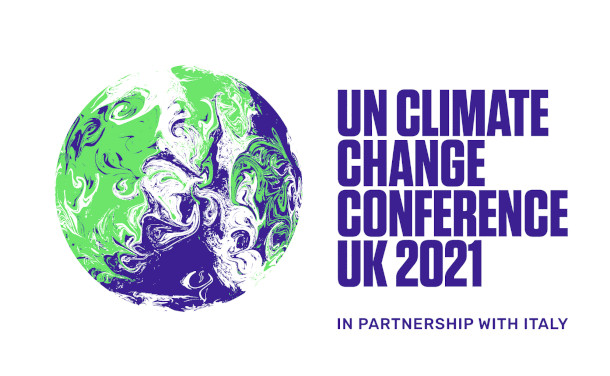
The official logo of the 26th UN Climate Change Conference of the Parties. (Photo: UK Government, Wikimedia Commons, OGL v.3)
ESSOP: Both, in terms of our experiences with the pandemic, and what we know about the climate crisis, who is historically responsible for the cause of climate change? Who's bearing the worst burdens of the impact of that crisis? Well, you will see it is rooted, not just in you know, institutionalized racism, but it's rooted in systems of colonialism, of imperialism, and the history of development, and industrialization, and also under development, and deliberate under development. So of course, we can't deal with a global crisis like climate in a way that ignores the roots of these problems, these systemic problems causing these crises. Now, the lesson from the pandemic, which is extremely, of course, disturbing, is when we are faced as humanity with a global crisis like the pandemic, and so too the climate crisis, if their response is to then say, we'll take care of our interests first, we'll take care of our company's interests first, before we will take care of another person living in another country. That lack of solidarity, of support, of just simple empathy is extremely worrying, for me, personally.
CURWOOD: Let me ask you something specific here. In terms of the COP, what's the benefit to having an in person set of climate negotiations as opposed to attempting, say, they create a virtual conference space now?
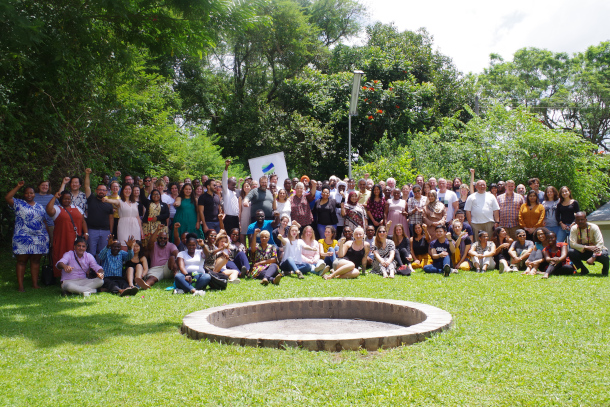
Staff and members of CAN International in Arusha, Tanzania during an annual strategy session. (Photo: Mickeyeva, Wikimedia Commons, CC BY-SA 4.0)
ESSOP: So Steve, you know, these negotiations are really tough. I mean, there's ongoing battles, you know, that it's taken many, many years to even get to a Paris Agreement. And it is tough, not because people are just trying to be difficult, it's tough exactly because of the issues that you speak to, you now, about all these institutionalized systemic challenges. But the nature of negotiations requires people to be together, look each other in the eye. It needs to be about building relationships, that relationship of trust that needs to be built up to deal with such a global crisis, in a context where, you know, people their track records haven't been proven good enough, etcetera, in terms of fulfilling commitments. That requires the personal engagement.
CURWOOD: Tasneem, how trustworthy are the rich and fully developed nations when it comes to dealing with climate. For example, in 2009, in Copenhagen, that promise was made that $100 billion a year would be provided by the rich countries to the poorer countries to help deal with climate disruption. To what extent have the rich countries delivered on that promise?
ESSOP: They haven't. And this is our big problem. You know, it's a decade ago that they made that commitment. And this 100 billion commitment by 2020, which was last year, was not fulfilled. And so there's a huge credibility gap. So please, fulfill your commitments, build the trust based on that. And then I'm sure that, you know, everybody will want to step up to do their fair share of what needs to be done to address this climate crisis.
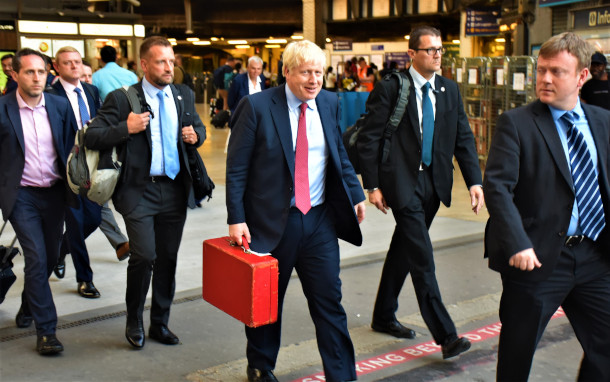
Boris Johnson, Prime Minister of the United Kingdom and host of COP26, scheduled to be held in Scotland November 2021. (Photo: David Sedlecky, Wikimedia Commons, CC BY-SA 4.0)
CURWOOD: Now, COP26, has already been postponed once before. It was originally slated to happen in November of 2020. What does it mean for climate negotiations for it to be pushed, later yet again?
ESSOP: Let me be very clear that the Climate Action Network has, is now over 30 years old. We've been working to fight the climate crisis for that long. We've been in this process of the UNFCCC, since its inception. There isn't another massive civil society network like ours that have dedicated its time, commitment, and energy to address the climate crisis. So, it was very difficult for us to make this call. But what we recognize is that the risks, again, this time round, will have an impact on the ability for this COP to be inclusive, not just only of the government delegations, but civil society, a critical voice, the voice, that keeps the pressure on these governments to act, you know, with urgency and ambition. What we're saying is, just delay it for a few months until we do get all these ducks in a row. Of course, we know that we don't have any control over the pandemic, but we do have control over vaccine rollout. And rich nations can do better in terms of that. And right now, we've been engaging, as we said, with the UK Government since May this year, not just CAN, but other observers, and right now, we still don't have a full picture of what their plans are to ensure a safe COP and an inclusive COP.
CURWOOD: As you see it, now, what do you think is the likelihood of the UK postponing an in-person COP?
ESSOP: Well, you know, Steve, they've been very clear that they will not postpone. And we've understood that right? They've been very clear right up until our engagement with them on Friday past that they have no intentions of postponing the COP. When we made the call for postponement, we did not say we will boycott because we understand it is our responsibility. And so, if the UK Government does go ahead with a COP, we will be there. Limited, but we will be there.
CURWOOD: How do you feel about that?
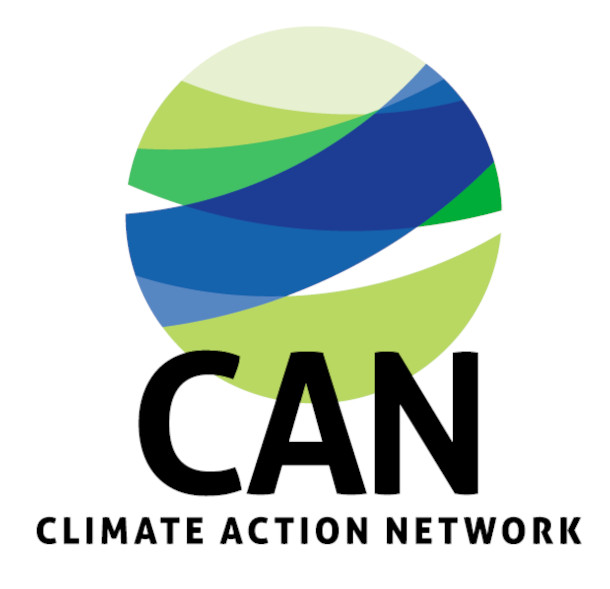
Climate Action Network’s official logo. (Photo: Climate Action Network, Association, e.v., Wikimedia Commons, CC BY-SA 4.0)
ESSOP: I feel, you know, at a very personal level, you know, we've been put under this, you know, duress essentially, right? It's highly, it makes me feel anxious that we've been dedicating our lives to fight the climate crisis. These COPS are important moments, of course, to keep the momentum and the pressure, etcetera. But that we are now going to have to make this choice, potentially risking your life, actually, because even the UK admits that they expect that there will be Coronavirus infections at the COP. So, we have to make that choice. And because the pressure has been put in the way that says, if we don't have this COP, this is the last chance to basically save us or, you know, keep 1.5 degrees alive kind of messaging. That puts a further burden on us. But no government has to wait until Glasgow to already start. They should have. Their national commitments were supposed to be ambitious. They were supposed to deliver those last year already. Many of them did not. So, they need to do the things they're committed to do.
CURWOOD: Tasneem Essop is the executive director of the Climate Action Network International. Thank you so much for taking the time with us today.
ESSOP: Thank you very much. Thanks, Steve. Thanks for inviting me onto your show. Really appreciate it.
CURWOOD: Our pleasure.
Links
Climate Action Network Main webpage
UK Government Red listed countries and restrictions
Living on Earth wants to hear from you!
Living on Earth
62 Calef Highway, Suite 212
Lee, NH 03861
Telephone: 617-287-4121
E-mail: comments@loe.org
Newsletter [Click here]
Donate to Living on Earth!
Living on Earth is an independent media program and relies entirely on contributions from listeners and institutions supporting public service. Please donate now to preserve an independent environmental voice.
NewsletterLiving on Earth offers a weekly delivery of the show's rundown to your mailbox. Sign up for our newsletter today!
 Sailors For The Sea: Be the change you want to sea.
Sailors For The Sea: Be the change you want to sea.
 The Grantham Foundation for the Protection of the Environment: Committed to protecting and improving the health of the global environment.
The Grantham Foundation for the Protection of the Environment: Committed to protecting and improving the health of the global environment.
 Contribute to Living on Earth and receive, as our gift to you, an archival print of one of Mark Seth Lender's extraordinary wildlife photographs. Follow the link to see Mark's current collection of photographs.
Contribute to Living on Earth and receive, as our gift to you, an archival print of one of Mark Seth Lender's extraordinary wildlife photographs. Follow the link to see Mark's current collection of photographs.
 Buy a signed copy of Mark Seth Lender's book Smeagull the Seagull & support Living on Earth
Buy a signed copy of Mark Seth Lender's book Smeagull the Seagull & support Living on Earth

